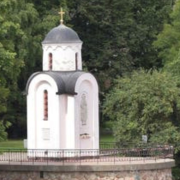One of the things I like about the Eastern Orthodox tradition, is that the monasteries and not the universities have been the seedbed of theological reflection. Theology is not simply a matter of deducing conclusions from premises as you might do with geometry; rather, theology is integrally tied to mysticism and the life of prayer.
Here is how the 5th century saint, Diadochus of Photiké, described this in his “On Spiritual Perfection,” as included in The Philokalia Volume One:
“Our intellect often finds it hard to endure praying because of the straitness and concentration which this involves; but it joyfully turns to theology because of the broad and unhampered scope of divine speculation. Therefore, so as to keep the intellect from expressing itself too much in words or exalting itself unduly in its joy, we should spend most of our time in prayer, in singing psalms and reading the Holy Scriptures, yet without neglecting the speculations of wise men whose faith has been revealed in their writings. In this way we shall prevent the intellect from confusing its own utterances with the utterances of grace, and stop it from being led stray by self-esteem and dispersed through over-elation and loquacity. In the time of contemplation we must keep the intellect free of all fantasy and image, and so ensure that with almost all our thoughts we shed tears. When it is at peace in times of stillness, and above all when it is gladdened by the sweetness of prayer, not only does it escape the faults we have mentioned, but it is more and more renewed in its swift and effortless understanding of divine truth, and with great humility it advances in its knowledge of discrimination. There is, moreover, a prayer which is above even the broadest scope of speculation; but this prayer is granted only to those who fully and consciously perceive the plentitude of God’s grace within them.”


 “Our intellect often finds it hard to endure praying because of the straitness and concentration which this involves; but it joyfully turns to theology because of the broad and unhampered scope of divine speculation. Therefore, so as to keep the intellect from expressing itself too much in words or exalting itself unduly in its joy, we should spend most of our time in prayer, in singing psalms and reading the Holy Scriptures, yet without neglecting the speculations of wise men whose faith has been revealed in their writings. In this way we shall prevent the intellect from confusing its own utterances with the utterances of grace, and stop it from being led stray by self-esteem and dispersed through over-elation and loquacity. In the time of contemplation we must keep the intellect free of all fantasy and image, and so ensure that with almost all our thoughts we shed tears. When it is at peace in times of stillness, and above all when it is gladdened by the sweetness of prayer, not only does it escape the faults we have mentioned, but it is more and more renewed in its swift and effortless understanding of divine truth, and with great humility it advances in its knowledge of discrimination. There is, moreover, a prayer which is above even the broadest scope of speculation; but this prayer is granted only to those who fully and consciously perceive the plentitude of God’s grace within them.”
“Our intellect often finds it hard to endure praying because of the straitness and concentration which this involves; but it joyfully turns to theology because of the broad and unhampered scope of divine speculation. Therefore, so as to keep the intellect from expressing itself too much in words or exalting itself unduly in its joy, we should spend most of our time in prayer, in singing psalms and reading the Holy Scriptures, yet without neglecting the speculations of wise men whose faith has been revealed in their writings. In this way we shall prevent the intellect from confusing its own utterances with the utterances of grace, and stop it from being led stray by self-esteem and dispersed through over-elation and loquacity. In the time of contemplation we must keep the intellect free of all fantasy and image, and so ensure that with almost all our thoughts we shed tears. When it is at peace in times of stillness, and above all when it is gladdened by the sweetness of prayer, not only does it escape the faults we have mentioned, but it is more and more renewed in its swift and effortless understanding of divine truth, and with great humility it advances in its knowledge of discrimination. There is, moreover, a prayer which is above even the broadest scope of speculation; but this prayer is granted only to those who fully and consciously perceive the plentitude of God’s grace within them.”